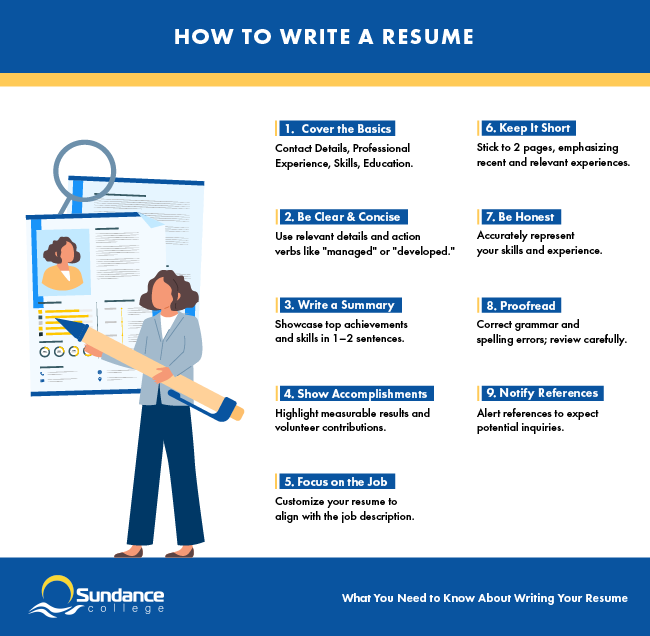Blog / How to Write a Resume – Do’s and Don’ts for Resume Writing
Sundance Blog
How to Write a Resume – Do’s and Don’ts for Resume Writing

Explore our Diploma Programs
- Business, Hospitality, and Legal
- Health and Human Services
- Technology
Table of Contents
Creating a standout resume requires clear organization, attention to detail, and a focus on the role you’re pursuing.
A well-written resume highlights your experiences, skills, and value to potential employers. Using practical resume writing tips, like emphasizing relevant details and avoiding common mistakes, can help you present yourself as a strong candidate.
Whether you’re starting your career or seeking a new opportunity, these tips will guide you in building a resume that makes you stand out.
Listen to: How to Write a Resume? – Do’s and Don’ts for Resume Writing
Do’s and Don’ts to Write Your Professional Resume
Effective Tips and Strategies for Resume Writing
1. Cover the Basics
Structure your resume with these four sections:
- Contact Details: Include your name, email, phone number, and location.
- Professional Experience: Highlight relevant work and volunteer roles.
- Skills: Focus on job-specific abilities like software expertise or teamwork.
- Education: List your diploma, institution name, and any certifications.
Organizing your resume this way keeps it professional and easy to follow.
2. Be Clear and Concise
Hiring managers spend only seconds reviewing resumes. Include relevant information and use straightforward language. Start bullet points with impactful verbs like managed, developed, or achieved to highlight results.
3. Write a Summary Statement
In one or two sentences, highlight your top achievements and skills that relate to the job. Keep it brief and focused on the role.
4. Highlight Accomplishments
Emphasize your successes by detailing how you applied your skills in past roles. Include measurable results and any relevant volunteer work.
5. Focus on the Job
Adjust your resume for each application by reflecting the job description’s language and requirements. This shows your suitability for the role.
6. Keep It Short
Prioritize recent and relevant experience, limiting your resume to two pages to keep it manageable and engaging.
7. Be Honest
Present your skills and experience accurately. Represent your strengths confidently without exaggeration.
8. Proofread Thoroughly
Errors in spelling or grammar can hurt your chances. Review your resume carefully, and ask someone else to check for mistakes you may have missed.
9. Notify Your References
Give your references a heads-up that they may be contacted. This helps them prepare to speak positively about your work and skills.
These steps will help you create a professional, well-organized resume that effectively presents your qualifications.

Mistakes to Avoid While Creating your Resume
Mistakes on your resume can affect your chances of getting shortlisted. Here are some common resume mistakes to avoid and simple tips to get it right:
- Unprofessional Email Address
Use a professional email based on your name. Avoid nicknames, numbers, or special characters. - Unnecessary Personal Details
Skip details like age, marital status, religious views, or your Social Insurance Number. - Personal Pronouns
Write in the third person; avoid pronouns like ‘I,’ ‘my,’ or ‘me.’ Use action-oriented statements, e.g., “Managed a team of 10″ instead of “I managed a team of 10.” - Generic Job Responsibilities
Showcase specific achievements and examples instead of listing generic duties. - Excessive Bullet Points for Resumes
Keep sections concise with up to five relevant bullet points per subsection. - Irrelevant Hobbies
Only mention hobbies if they relate to the job. - References on Resume
Provide references separately, only when requested by the employer.
Skills to Mention in a Resume
The skills section in your resume is your chance to show what you’re good at and how you can add value to a company. A mix of soft skills and technical skills gives employers a clear picture of both your interpersonal strengths and technical abilities. Here are some examples to get you started:
Soft Skills
These personal attributes reflect how you collaborate and approach tasks.
- Communication: Sharing ideas clearly in both written and verbal formats.
Example: Presented project updates to stakeholders, leading to improved decision-making. - Problem-Solving: Addressing challenges and delivering solutions.
Example: Resolved workflow bottlenecks, reducing turnaround times by 20%. - Time Management: Organizing tasks to meet deadlines efficiently.
Example: Managed multiple priorities, delivering projects on schedule without delays. - Leadership: Guiding teams and fostering collaboration to achieve goals.
Example: Mentored a team of five, resulting in a 25% increase in productivity. - Adaptability: Adjusting to changes in priorities, tools, or environments.
Example: Transitioned to new software platforms, reducing team learning time by 30%.
Technical Skills
These technical abilities show your readiness to perform specific tasks and achieve results.
- Data Analysis: Using tools to interpret data and make informed decisions.
Example: Analyzed customer trends using SQL, increasing retention by 15%. - Project Management: Coordinating resources and tasks to meet goals.
Example: Directed a cross-functional team to deliver a product launch on time and within budget. - Technical Proficiency: Experience with relevant software or tools in your industry.
Example: Designed promotional materials with Adobe Suite, improving engagement rates. - Language Proficiency: Fluency in multiple languages for diverse roles.
Example: Provided bilingual customer support, increasing satisfaction scores. - Programming: Writing code for applications or systems to enhance operations.
Example: Developed a web-based solution, improving efficiency by 25%.
How to Make a Resume for Your First Job?
Writing a resume with no experience might feel overwhelming, but it doesn’t have to be. The key is focusing on your skills, education, and any practicums or projects you’ve done. Here’s how to put together a resume that grabs attention:
1. Begin with Contact Information and an Objective
Start with your name, phone number, and email. Add a short objective that highlights your training and enthusiasm.
Example: Addictions support worker trained in crisis intervention and client care. Dedicated to helping clients through recovery programs.
2. Highlight Your Education
Your education can be a strong asset. List your program, institution, and graduation date. Include coursework or projects related to the role.
Example:
Addictions and Community Health Professional Diploma
Sundance College, Calgary, AB
Graduation: June 2023
3. Include Relevant Experiences
Use volunteer work, practicums, or personal projects that relate to the job.
Example: Assisted in organizing community health workshops, engaging with participants and providing resources for mental health support.
4. Focus on Your Skills
List abilities that match the role, combining soft skills and technical proficiencies.
Examples:
- Crisis intervention
- Time management
- Report writing
- Conflict resolution
- Communication
5. Add Certifications or Extras
Certifications like CPR or Mental Health First Aid can add value. You can also include languages or hobbies if relevant.
6. Keep It Professional
- Use a clean format with clear headings.
- Stick to readable fonts like Arial or Calibri.
- Keep the text size between 11–12 pt.
- Proofread to avoid errors.
By keeping your sentences concise and to the point, your resume will be clear, polished, and professional.
Difference between CV and Resume
In Canada, resumes and CVs serve distinct purposes and formats, each suited to specific needs.
1. Purpose
- Resume: A brief document (up to two pages) focused on your skills and experiences for a particular job.
- CV: A detailed account of your academic and professional background, often used in research, medical, or academic fields.
2. Content
- Resume: Highlights relevant experiences and achievements to suit the job you’re applying for.
- CV: Includes a comprehensive history of your education, research, publications, and other professional details.
3. Length
- Resume: Concise and direct.
- CV: Longer and more in-depth, with no strict page limit.
Choosing between a resume and a CV depends on the role and industry. A resume works best for most job applications, while a CV is ideal for academic, medical, or research-focused opportunities.
Sundance College Is Here To Help!
At Sundance, we are dedicated to supporting our students’ success, and that doesn’t end in the classroom. After all, we’re as excited as you are when you begin your new career!
To propel you toward that moment, our Career Services team provides a full range of supportive services to graduating students, such as resume preparation, interview skills, and job search techniques.
To learn more about how you can start your journey toward your new career, simply fill out this form: Request Info. Your personal Admissions Advisor will be in touch to answer all your questions.
